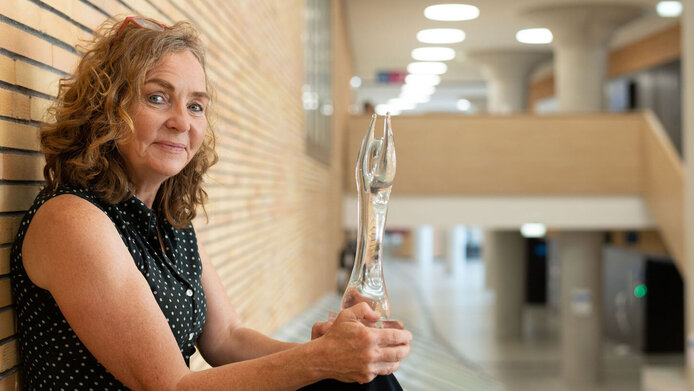Why the smallest organisms play the biggest role

Why are you interested in archaea, and what questions are you trying to answer?
Christa Schleper: Our research centres on gaining a better understanding of the phase of evolution that saw the emergence of more complex organisms, meaning plants and animals. Looking back to the origin of life, the first cells probably emerged some four billion years ago. Archaea and bacteria evolved divergently from this “last universal cellular ancestor” – LUCA for short. They only reunited some two billion years later, and more complex life forms then evolved from this union of archaea and bacteria. We inherited the archaea’s way of passing on genetic information, such as DNA replication, and the bacteria’s way of generating energy.
How do you study this early history of life?
Schleper: There was a truly seminal moment in 2015. In samples from deep marine sediments off the Norwegian coast, my PhD student found a new lineage of archaea that is apparently closely related to ancestors of complex life forms, because it has many genes otherwise only found in plants and animals. We called them Lokiarchaeota, because they were found near a hydrothermal vent called “Loki’s Castle”, named for an ancient Norse god. Thanks to the genetic markers we obtained from them, we were then able to promptly find similar archaea in many places, even in the Danube in Vienna. There are some fascinating publications yet to come in this field. We will continue with this research, as will many other working groups, because the emergence of complex life forms from simple microorganisms is one of the great mysteries of biology.
How come these archaea went unrecognised in samples for so long, and what methods are used in this research?
Schleper: If you were a microbiologist from 100 years ago, you would try to directly cultivate the microbes from samples. However, that is very challenging to do with many archaea. In research today, we mainly analyse genetic information – using PCR, for instance, just like for Covid testing. You look for a specific gene, which will then tell you which species you are looking at. What you need for this, however, is the right PCR primer (a sort of probe that finds the piece of DNA involved in DNA replication). Archaea are often overlooked in PCR tests because researchers aren’t using the right primers to find them, precisely because archaea are so different from bacteria. If you have interesting samples, you can use high throughput processes to decode entire genomes of a microbiome. That was how we explored the new genetic sequence space of the Lokiarchaeota at the time.
How will you use the Wittgenstein Award in your research?
Schleper: I am happy to say that the Wittgenstein Award will give me more leeway to tackle ecologically relevant issues to an even greater extent. There is a group of archaea that has spread throughout nature – in bodies of water, in soil, and even on our skin. These archaea are involved in the nitrogen cycle, competing for nitrogen compounds with plants. In agriculture, we want to make sure that plants have enough nitrogen, which is why we often use a lot of nitrogen-based fertilizer. Moreover, archaea produce a harmful greenhouse gas – nitrous oxide, known as laughing gas – as a by-product, accelerating the climate crisis. If we know more about these archaea, and if we could inhibit them, we will perhaps need less fertilizer, and could reduce greenhouse gas emissions. By the way, the archaeon that is the namesake of this globally occurring group of organisms comes from the soil underneath our old institute in the 9th district of Vienna, and is called Nitrososphaera viennensis.
What does recognition through the Wittgenstein Award mean to you, personally?
Schleper: It is of course a very great honour that makes me very happy, and I think it’s great that it will make archaea better known. After all, we only realised their significance in the current century – in the past 20 years, really. I think that greater awareness of microorganisms that are so important for our planet’s ecology is a good thing. I am also happy about the award on behalf of the many young, motivated, wonderful people whom I’ve done research with over the years. I immediately thought back to all the times we forged new paths in archaea research together.
Christa Schleper studied biology in Aachen and Constance, earned her doctorate in Munich, and worked in research and teaching in the USA (Caltech, UC Santa Barbara), Norway (Bergen) and Germany (Darmstadt). She has been a professor at the University of Vienna since 2007. She was one of the first in her research field to use metagenomic methods, and has studied archaea since the beginning of her career. In 2016, she received one of the prestigious ERC Advanced Grants from the European Research Council, endowed with EUR 2.5 million, and she is one of the most frequently quoted researchers in the world. The focus of her research is on evolutionary biology and the ecological significance of archaea.
About the project
In her research group Archaea Ecology and Evolution at the University of Vienna, Christa Schleper and her team study the ecology, molecular biology and evolution of archaea, virus-host interactions, and microorganisms that cannot (yet) be cultivated, as well as new, archaea-based biotechnologies. An area of special interest is the study of ammonia-oxidizing archaea (AOA) and their significance in the nitrogen cycle.
The Wittgenstein Award
The Wittgenstein Award is Austria’s most generously endowed science award; outstanding researchers of all disciplines are eligible for it. Endowed with EUR 1.5 million, the award supports the winners in conducting their research, guaranteeing them utmost freedom and flexibility, and enabling them to develop their research activities at the highest international level.





